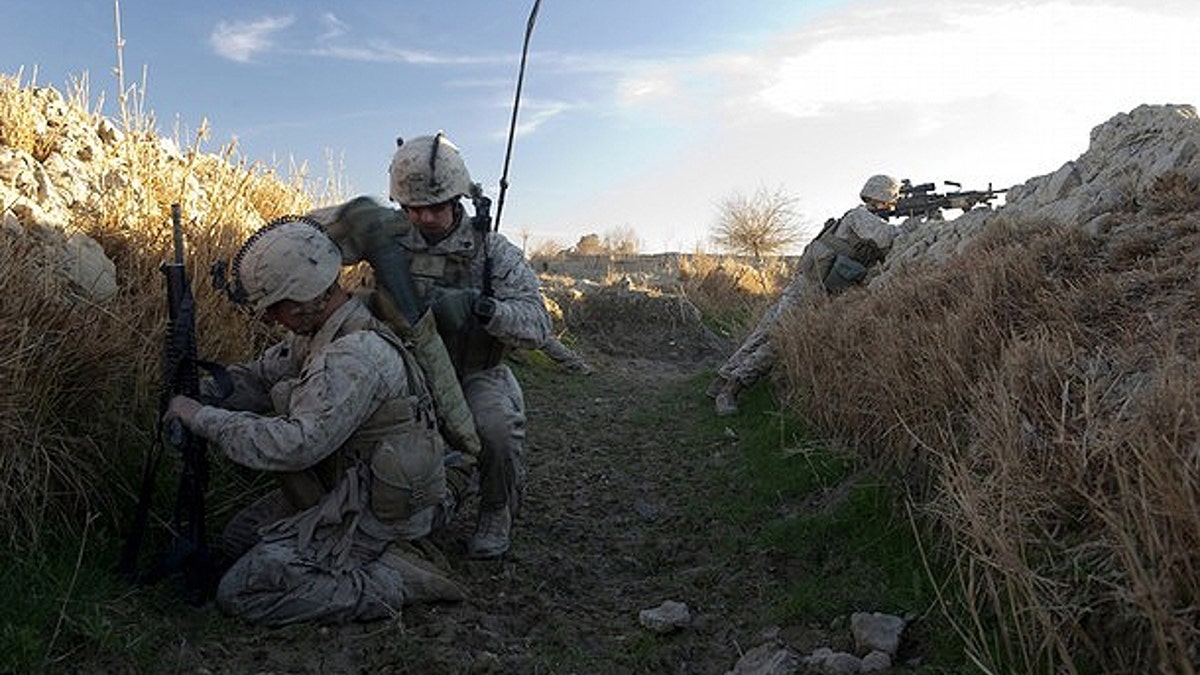
Feb. 8: U.S. Marines from 1st Battalion, 8th Marines, Bravo company patrol around Mirage patrol base, Musa Qala District, in Afghanistan's Helmand province. (AFP)
The Pentagon is downplaying a new report that claims efforts to withdraw U.S. troops from Afghanistan this summer will be complicated by the military's heavy reliance on "civil affairs officers" -- ill-equipped reservists tasked with nation-building exercises.
A spokesman for the Pentagon says that the Army now provides the necessary resources and training to civil affairs officers before they are deployed to war zones.
"We have learned much over the past several years," Lt. Col. Robert Ditchey, a Pentagon spokesman, told Fox News in an e-mail. "Today, the Army provides fully manned, trained and equipped active and reserve units."
Ditchey said that the Army's units, including civil affairs officers, "undergo a certification exercise before they deploy to ensure they are adequately trained and resourced to perform their directed missions in country," he said.
The Center for Public Integrity, which identifies itself as muckraking journalists bent on making public institutions more transparent and accountable, issued a report Sunday saying that civil affairs soldiers -- those organized by the Pentagon to help spread good will in Iraq and Afghanistan by restoring electricity, building water systems and doing other construction -- died in the Iraq and Afghanistan wars in disproportionate numbers to the military as a whole.
"The statistics offer a grim picture. Though civil affairs soldiers only make up about 5 percent of the Army's reserve forces, they account for 23 percent of the combat fatalities among reservists in Iraq and Afghanistan," reads the report.
The units, comprised of reservists who were specialists in their technical fields, but not in war, were sent into combat zones under-equipped, ill-trained and in inflated numbers, the report reads. As a result, the "ghost soldiers" often couldn't perform their duties.
"Generals in the field, unable to obtain sufficient civil affairs units, sent reservists into harm's way without hardened armored vehicles, protective plates for their armored vests and machine guns," the report reads.
Ditchey acknowledged there were "shortfalls" in units like civil affairs during the early days of the wars in Afghanistan and Iraq. But he said "the Army has since added significant force structure that has mitigated previous shortfalls."
The report also takes direct aim at Donald Rumsfeld for the problems, saying the former defense secretary didn't find civil affairs units "worthy of Special Operations" and should be removed from its roles and missions. It links passages in Rumsfeld's recent memoir to suggest that he had little regard for the soldiers.
"I did not think resolving other countries' internal political disputes, paving roads, erecting power lines, policing streets, building stock markets, and organizing democratic governmental bodies were missions for our men and women in uniform," Rumsfeld reportedly writes in his new memoir.
"If some later contended that we never had a plan for full-fledged nation building or that we under-resourced such a plan, they were certainly correct. We did not go there to try to bring prosperity to every corner of Afghanistan. I believe -- and continue to believe -- that such a goal would have amounted to a fool’s errand," the report reads, quoting the book "Known and Unknowns."
In an interview that aired Monday on ABC, Rumsfeld conceded that "it's possible" decisions on troop levels for Iraq were the biggest mistake of the war. But he said, while many decisions cost lives in war, he "doesn't have enough confidence to say that that's right."
"I think that it's possible. We had (an) enormous number of troops ready to go in. They had -- we had off-ramps, if they weren't needed," he said, adding, "It's hard to know. You know, the path you didn't take is always smoother."
CPI argues that because of such limitations in the civil affairs units, the "legacy of dysfunction" complicates U.S. efforts to withdraw from Afghanistan this summer "and calls into question the ability of the military to fight future insurgencies or respond to humanitarian disasters."
The report reads that currently only about 8,000 Army troops are in civil affairs, and those numbers aren't expected to increase beyond 11,152 troops by 2013.




